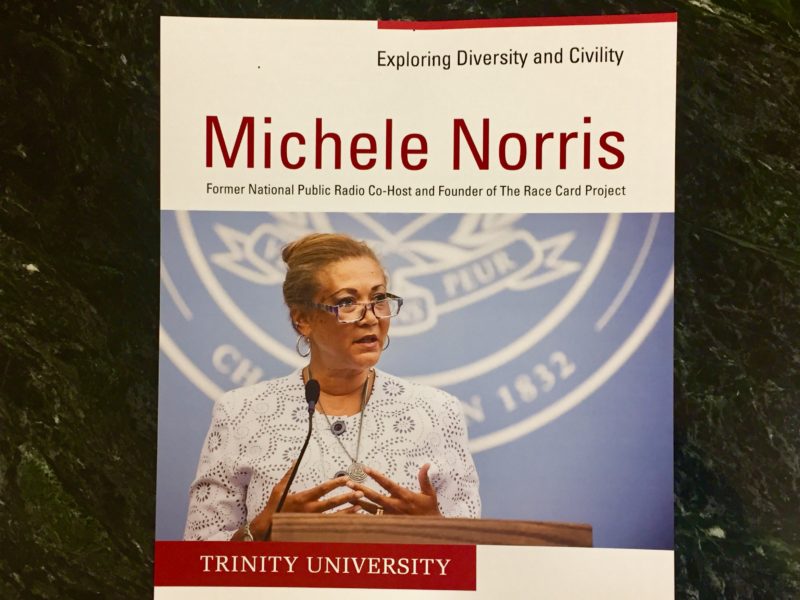Michele Norris, award winning journalist and founder of The Race Card Project will speak at Trinity on Feb. 7 at 7 p.m. The lecture is sponsored by the Andrew W. Mellon Foundation in partnership with NPR’s Dare to Listen campaign and was coordinated by the office of Academic Affairs.
Sharon Schweitzer, assistant vice president for External Affairs, described the impetus for asking Norris to speak at Trinity as arising from Trinity’s commitment to open discussions on difficult topics.
“It kind of sprang out of a lot of conversations about continuing to have some dialogue around race, around civility and around some of the divisiveness that we experienced throughout the presidential election. I think inviting Michele Norris is a public way that we want to show that the university is committed to an open dialogue about things that are sometimes very difficult to talk about, and to do it in such a respect that we can have a difficult discussion about difficult topics and to do them in a respectful and civil way,” Schweitzer said.
Norris developed the Race Card Project during a sabbatical from her NPR show, “All Things Considered.” Susie Gonzalez, senior manager of public relations, summarizes its development.
“In 2002, Norris began as co-host of National Public Radio’s newsmagazine All Things Considered, public radio’s longest-running national program, with Robert Siegel and Melissa Block. During a sabbatical from that program during the 2012 presidential campaign, Norris traveled the country and developed two successful initiatives: The Race Card Project, which captures people’s views on race in six-word sentences, and NPR’s Backseat Book Club for junior brainiacs,” Gonzalez said.
The Race Card Project asks people to assess their experiences with race and summarize them into a six-word sentence. Morris discusses the concept below.
“I asked people to think about their experiences, questions, hopes, dreams, laments or observations about race and identity. Then, I asked that they take those thoughts and distill them to just one sentence that had only six words. People took the cards with them and mulled over the assignment. I hoped that a few might send them back to me via email or through the U.S. Postal Service. I tried to be realistic, set low expectations and then held my breath. Well, much to my surprise an awful lot of people took the bait,” Norris wrote.
The Race Card Project offers the opportunity for people to see how race is experienced around the country, and this will be the focus of Norris’ lecture.
“I really think that she’s probably going to focus a great deal of her presentation about the Race Card Project and what motivated her to start it. The Race Card Project really encourages people to condense their experiences about race to one sentence using six words. I think that what this has done is that it has opened a window for people to see how race has been experienced around the country. She’s an African-American reporter, so I think this is a topic that’s rather close to her person. I would imagine that a lot of her presentation would be about that aspect, but about her journey in becoming a well known journalist and radio host,” Schweitzer said.
Part of the purpose of this lecture is to help people feel comfortable in their ability to defend their values and understand the views of those different from them.
“I hope that what they get out of this is that they will find a comfort level to lean into these discussions rather than pull away about the divisions and the polarizations that our country is experiencing in how we talk to one another, how they interact with one another. We really hope that they come back armed with ways that they can feel grounded in their values to be able to speak out about something or talk to someone else who’s different than them and open their eyes and ears a little bit to listen and to create understanding for people who are different from them or have a different opinion from them themselves,” Schweitzer said.
One hope for those attending the lecture is that it will help people in having a conversation with one another in such divisive times.
“I don’t think the polarization has gone away since the election. We’re in the midst of a polarizing conversation around the country. We’ve seen the protests around the country occurring because of an executive order or two from President Trump. I think it’s really important that we understand that we have these opportunities by someone that’s willing to put themselves out there, particularly someone like Ms. Norris who put themselves out there in a way that helps us learn how we can best have a conversation with one another over things that we disagree about in this country,” Schweitzer said.







